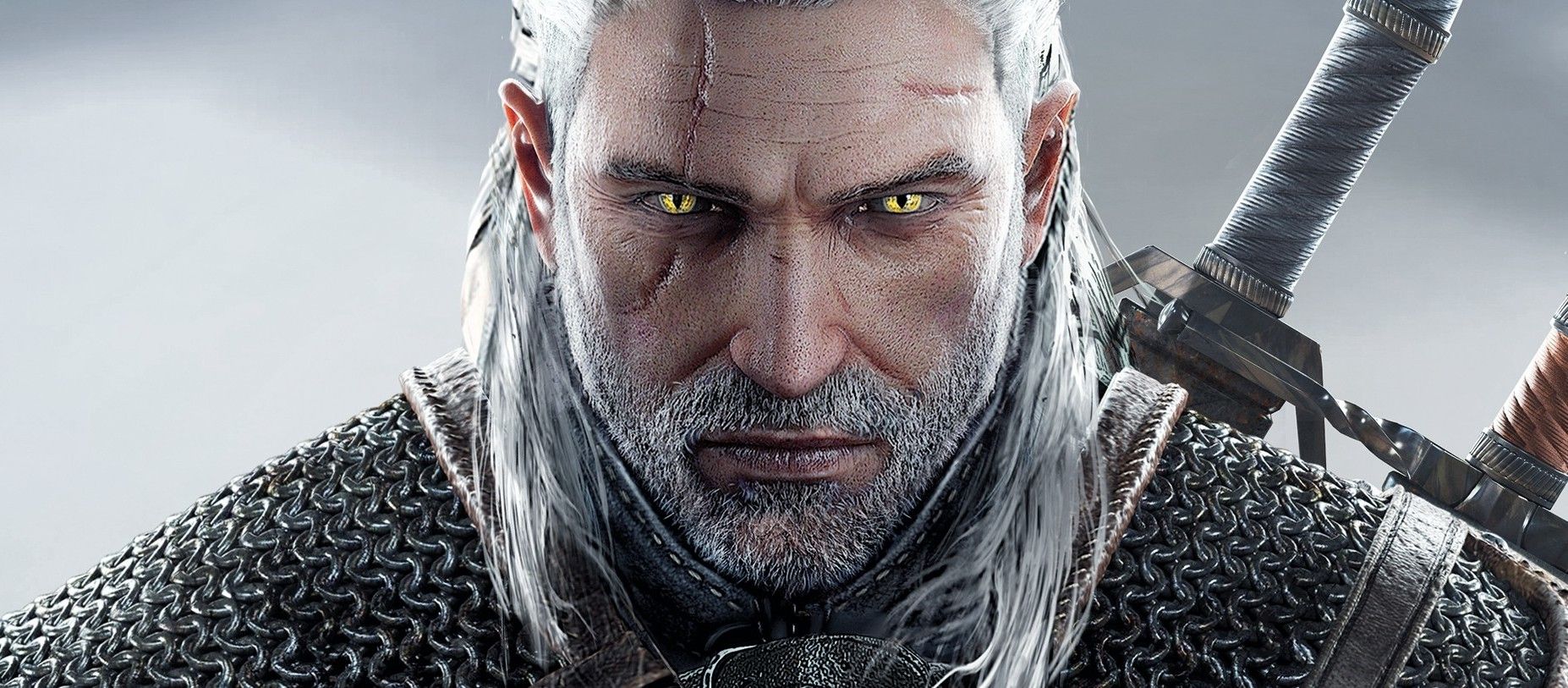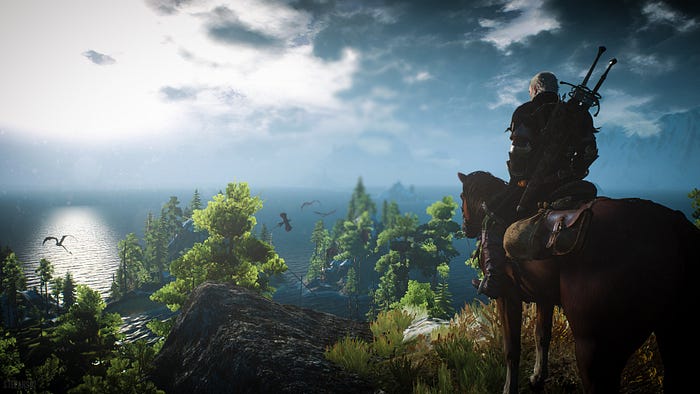A Witcher's Pain
How Geralt’s journey with chronic pain is helping me with my own

It is 3:32AM and a white hot pain races across my leg. If I move, it flares angrily, if I remain still it continues to burn. This is the third time nerve pain has woken me up. I hope this will be the last, but I’ve learned to be cautiously optimistic.
The night brings in different beasts of pain.
My sleeping routine used to be pleasantly boring. However, at the start of the year I found myself waking to sharp pain. No massaging would make it go away and my skin would take on an uncomfortable pins-and-needles sensation. I ignored it. It’ll go away, right? As weeks progressed, the pain came to haunt me more frequently in my sleep and soon, during the day. Now it follows me, never quite allowing me to be comfortable for long.
As I’m now in tears, paralyzed, waiting for this moment to pass, a delirious thought passes across my mind: “I wonder if Geralt of Rivia deals with this.”

I fell in love with the Witcher series years ago when I first got my hands on Witcher 3. The world, lore, characters, and Geralt himself kept me playing for hours, turning to the older games and Andrzej Sapkowski’s novels for more.
Geralt is a compelling protagonist. He is weary of everything and everyone, grumbles quite a bit, can take down monsters, verbally and physically take out scumbags, and yet has a softness and understanding reserved for those he cares for. Often stories create protagonists that feel beyond us, but I found aspects of Geralt I could relate to.
With my days now focused on managing my recurring nerve pain, I turned back to the Witcher series, specifically Geralt’s management of his own pain in the novels.

Geralt’s Chronic Pain
While it’s, sadly, not explored in the Witcher games (but may be in the TV series), Geralt deals with chronic pain in the novels. This pain stems from an injury he sustained from a duel with Vilgefortz of Roggeveen, an extremely powerful mage.
In Time of Contempt, Vilgefortz crushes Geralt. In just a page of text, Geralt crumples to his knees, vulnerable and in terrible shape. All of us are waiting for Vilgefortz to do the unthinkable: finish Geralt off. Yet, he’s spared, but not before being broken further by the mage.
“He tried to protect his head with his left hand, but the staff fell with enough force to break his forearm. The pain utterly blinded him… Now Geralt could see nothing and hear nothing. He was sinking, submerging into something warm. He thought Vilgefortz had gone. He was astonished, then, when a fierce blow from the iron staff struck his thigh, smashing the shaft of his femur” (Sapkowski, 1995 p. 196).
This duel leaves Geralt with a broken leg, arm, internal bleeding, and excruciating pain. While the dryads and the Waters of Brokilon will heal him, he’ll complain of chronic pain later in the novels. The novels make it clear to readers that while Geralt’s bones have been repaired, it doesn’t mean Geralt is free from pain.
This isn’t unheard of. Injuries can cause long-term damage to your nerves and still be present years after the injury has healed.
Because it’s an issue with his nerves, Geralt expresses confusion in Baptism of Fire because he’s not feeling strong pain in the most expected places. He feels more intense pain in his knee and elbow, despite his thigh, hip, and forearm being the areas broken and repaired.
Regis, our barber-surgeon vampire friend, will explain that the dryads’ magic “reconstructed [his] damaged bone, but simultaneously caused a minor upheaval in [his] nerve trunks” (Sapkowski, 1996, p 129). I can’t help but compare my situation with Geralt’s.
While Geralt’s pain is around the same area as his injury (localized), mine is further separated. The injured area is on my spine, but I feel the pain in my leg because of the nerve that runs against it.
As odd as it’s going to sound, re-reading this exchange was comforting. There is a sense of relief in knowing how and why this pain came to be, but to also have the pain readily acknowledged as real by someone other than you.

Geralt’s Support System
Before I received more thorough and intense care, the source and reason behind my pain was a mystery. Not knowing why you’re hurting and falling down the Internet rabbit hole (WebMD’s classic ‘you have all the rare spinal issues in the world’ diagnosis) was a dangerous combo. It led to many tearful bouts of anxiety and panic.
The COVID-19 pandemic made receiving appropriate care difficult. Since my healthcare facility was not allowing in-person appointments, I relied on telephone and video calls. There were many awkward and frustratingly unproductive moments I’ve found myself in with the video calls. I’d try my best to display my mobility to my doctor (short-lived catwalks in my apartment, me leaning left and right, bending this way and that) as they squint at me through the screen, trying.
It was until I could go in-person did the answers find me. Being able to make sense of what I was experiencing and, finally, having a plan on how to move forward lessened my anxiety. Most importantly, having people around me acknowledge my pain and show compassion (not pity) made me feel as if I was surrounded by Geralt’s circle of support.
Unfortunately, when I was open with my pain with others, I found a different reaction. They met me with an onslaught of unneeded advice and diagnoses. There were even some who privately questioned me as to if I actually had this recurring pain because I could walk about.
Chronic pain is complex and invisible. It’s not something you can visually take in.
While the advice and inquiries may come from a place of care, it actually silences and diminishes my voice. Trust that I am doing all I can to find relief.
It’s why I appreciate Regis in this scene with Geralt. Here was an interaction with someone who has the knowledge, and Geralt was not grilled to prove the authenticity of his pain.

We’ll see Geralt throughout complain of pain during his journeys. It’s when he’s on Roach for too long or the weather turning chilly. Different things set off his pain, just as it is with me. I can feel pain when I’m sitting in one position for a while, laying down, or even simply walking about. What sets the pain off varies, as does the severity and length of time it stays with me. There is no one nerve pain shoe fits all.
What I further appreciated was Regis’ discussion with Geralt on how to manage said pain.
While powerful painkillers are an option, Regis actually warns Geralt not to rely on them. It’s best to treat the “causes, not [the] symptoms.” Regis’ words carry incredible wisdom. Geralt being Geralt opts instead to chug his painkiller.
While I don’t blame Geralt for going straight to the painkillers (I’m right there with you), Regis’ warning acts as an important reminder for myself and others.
A Witcher’s Pain and Why it Matters
I had no real understanding of what chronic pain or nerve pain was until it rudely invited itself into my life. It’s not something you see or hear in mainstream media. Even when I read Sapkowski’s novels years ago, I never processed what exactly Geralt was facing. It was only when this powerful article regarding Geralt as a disabled protagonist hit my feed did I stop and revisit his story.
“He was shown time and time again to be capable, strong, and to still have value as a person…”
Despite the recurring pain he faces, Geralt proves to be one of the most talented witchers out of the bunch. He can take out gargoyles, fiends, archgriffins — you name it. His pain doesn’t limit nor define him, but it is a part of his life.
It’s validating to read a story where we see a major character with this invisible pain and it be addressed more than once. Before my mind threw Geralt front and center, I felt incredibly isolated and alone in dealing with this recurring nerve pain. This pain frustrates me, leaves me despondent, and chronically exhausted. With nothing and no one to relate to, it was only magnified. Now I feel reassured — hopeful, even, as I turn the pages once more to Geralt’s story. I don’t have to be alone in this.
I can manage this pain. I can still do the things I love. Heck, I bet I can fight monsters, too.
It’s 3:32 AM and my thoughts are on Geralt, who probably has faced nights interrupted by pain. If he can get up and fight grave hags and ghouls, I can get up. I muster the strength to roll onto my stomach where I can push myself up. One, two, three — I’m up. I feel the pain fizzle into numbness.
It’ll take me time to better manage my pain. It’ll take a while before I can get comfortable again, but it will happen. And if this becomes a pain I deal with for years on end, I won’t let it limit me.
